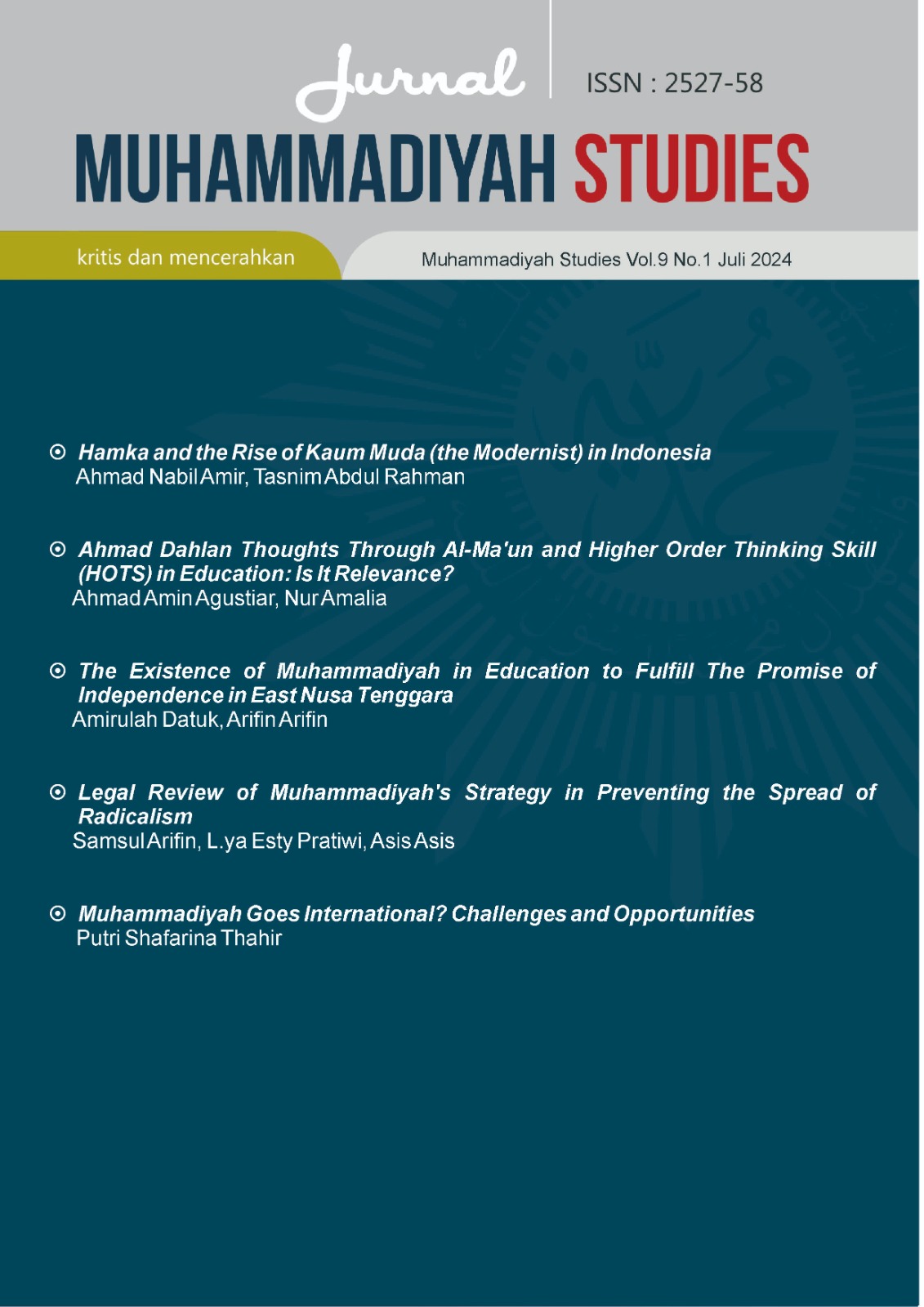Hamka and the Rise of Kaum Muda (the Modernist) in Indonesia
DOI:
https://doi.org/10.22219/jms.v9i1.35642Keywords:
Hamka, Muhammad Abduh, Tafsir al-Azhar, Reform, ModernistAbstract
The paper aims to study the historical background of the Islamic reform movement in West Sumatra with particular reference to the idea of Haji Abdul Malik Karim Amrullah or his pseudonym Hamka (1908-1981). His religious ideal was instrumental in driving the new consciousness and unprecedented religious struggle that erupted in the late 20th century in the Malay Archipelago, which reflected the force of modern ideas of Shaykh Muhammad Abduh (1849-1905) that had brought decisive and greatest influence in the region. The reform movement he inaugurated was carried out by Kaum Muda (the young faction) in the Malay Archipelago, who disseminated his dynamics ideas and aspirations through journals and newspapers such as Al-Imam, Al-Munir, and Saudara. One of the leading figures and pioneers in the struggle of Kaum Muda was Haji Rasul dan Kiyai Ahmad Dahlan, whose legacy was continued by Hamka, who was hailed as the foremost advocate of Abduh’s reformist ideas through his influential writing and activity. To highlight this significant work and idealism, this research presents and analyzes Hamka’s struggle to lead this unprecedented religious movement for reform (islah) and renewal (tajdid) in the Malay world. This research aims to develop his legacy and monumental contribution to the history and tradition of reform in the Malay world.
Downloads
References
Abdul Rahman, A. A. Pemikiran Etika Hamka. Kuala Lumpur: Utusan Publication & Distributors, 2007.
Abdul Rahman, A. A.. “Nilai Mencapai Kehidupan Sejahtera: Pandangan Hamka”, Malim, 10, 123-144, 2009.
Ahmad Ishak, M. S. (Ed.), Pemikiran dan Perjuangan Hamka. Kuala lumpur: Angkatan Belia Islam Malaysia (ABIM), 2001.
Fadzilah, D. “The Contribution of Tafsir Al-Manar and Tafsir Al-Azhar Towards Understanding the Concept of Ta-ah and its Observance: A Theological Inquiry” (PhD’s Thesis). University of Edinburgh, 2003.
Giora, E. “The Islamic Reformist Movement in the Malay-Indonesian World in the First Four Decades of the 20th Century: Insights Gained from a Comparative Look at Egypt”, Studia Islamika 9 (2), 47-87, 2002.
Hamka. Empat Bulan di Amerika. Djakarta: Tintamas, 1954.
, Kenang-Kenangan Ku Di-Malaya. Singapura: Setia Darma, 1957.
. Teguran Suci dan Jujur Terhadap Mufti Johor. Singapura: Persatuan Muhammadiyah Pusat, 1958.
. Pengaruh Muhammad Abduh di Indonesia: Pidato diutjapkan sewaktu akan menerima gelar doctor honoris causa dari Universitas Al Azhar di Mesir pada tgl. 21 Djanuari 1958. Jakarta: Tintamas, 1961.
. Ayahku. Jakarta: Djajamurni, 1962.
. Tuan Direktur. Kuala Lumpur: Pustaka Antara, 1966.
. Said Djamaluddin Al-Afghany: Pelopor Kebangkitan Muslimin. Jakarta: Bulan Bintang, 1970.
. Kenang-Kenangan Hidup. Jakarta: Bulan Bintang, 1974.
. Tafsir al-Azhar. 10 jil. Singapura: Pustaka Nasional, 1982.
. Dari Hati ke Hati. Jakarta: Pustaka Panjimas, 2005.
. Angkatan Baru. Kota Depok: Gema Insani, 2020.
James, R. R. Hamka’s Great Story: A Master Writer’s Vision of Islam for Modern Indonesia. Madison, WI: University of Wisconsin Press, 2016.
Kevin, W. F. “Hamka’s Doctoral Address at Al-Azhar: The Influence of Muhammad Abduh in Indonesia”, Afkaruna 11 (2), 125-156, 2015.
Khairudin, A.. Hamka and Islam: Cosmopolitan Reform in the Malay World. Ithaca: University of Cornell Press, 2018.
Khairudin Aljunied. Shapers of Islam in Southeast Asia: Muslim Intellectuals and the Making of Islamic Reformism. New York: Oxford University Press. 2023
Milhan, Y. “Hamka’s Method of Interpreting the Legal Verses of the Qur’an: A Study of his Tafsir Al-Azhar” (M.A.’s diss) Institute of Islamic Studies, McGill University, Montreal, 1995.
Mohammad, H. A. “Karya Nusantara Hamka” Kosmo, 6 Mei, 22-23, 2014.
Muhammad, H. J., Fakhrul Adabi, A. K. “Comprehensive Human Development Through Physical and Spiritual: Studies on the Novel “Tenggelamnya Kapal Van Der Wijck”, Procedia - Social and Behavioral Sciences (55), 1118-1123, 2012.
Muhammad, J. “Hamka’s Views on Some Major Religio-Political Issues in Indonesia” (M.A.’s diss). Kulliyyah of IRKHS, International Islamic University Malaysia, 1998.
Murni, D. “The Origin of the Islamic Reform Movement in Minangkabau: Life and Thought of Abdul Karim Amrullah”, Studia Islamika 5 (3), 1-45, 1998.
Rahmi, N. F. “Relasi Intelektual Minangkabau dengan Mesir Awal Abad XX”, Jurnal Thaqafiyyat 20 (1), 82-105, 2021.
Rusydi, H. Pribadi dan Martabat Buya Prof. Dr. Hamka. Jakarta: Pustaka Panjimas, 1981.
Steenbrink, Karel A. “Hamka (1908-1981) and the Integration of the Islamic Ummah of Indonesia”, Studia Islamika 1 (3), 119-147, 1994.
Taufik, A. Sekolah & Politik: Pergerakan Kaum Muda di Sumatera Barat 1927-1933, terj. Muhammad Yuanda Zara. Yogyakarta: Suara Muhammadiyah, 2018.
Wan Sabri, W. Y. “Hamka’s “Tafsir Al-Azhar”: Qur’anic Exegesis As a Mirror of Social Change” (PhD’s thesis) Temple University, 1997.
Downloads
Published
How to Cite
Issue
Section
License
Copyright (c) 2024 Ahmad Nabil Amir, Tasnim Abdul Rahman

This work is licensed under a Creative Commons Attribution 4.0 International License.
Copyright Notice
Authors who publish with Jurnal Muhammadiyah Studies agree to the following terms:
- For all articles published in the Jurnal Muhammadiyah Studies, copyright is retained by the authors. Authors give permission to the publisher to announce the work with conditions. When the manuscript is accepted for publication, the authors agree to the automatic transfer of the publishing right to the publisher.
- Authors retain copyright and grant the journal the right of first publication with the work simultaneously licensed under a Creative Commons Attribution 4.0 International License. that allows others to share the work with an acknowledgment of the work's authorship and initial publication in this journal.
- Authors are able to enter into separate, additional contractual arrangements for the non-exclusive distribution of the journal's published version of the work (e.g., post it to an institutional repository or publish it in a book), with an acknowledgment of its initial publication in this journal.
- Authors are permitted and encouraged to post their work online (e.g., in institutional repositories or on their website) prior to and during the submission process, as it can lead to productive exchanges, as well as earlier and greater citation of published work (See The Effect of Open Access).




